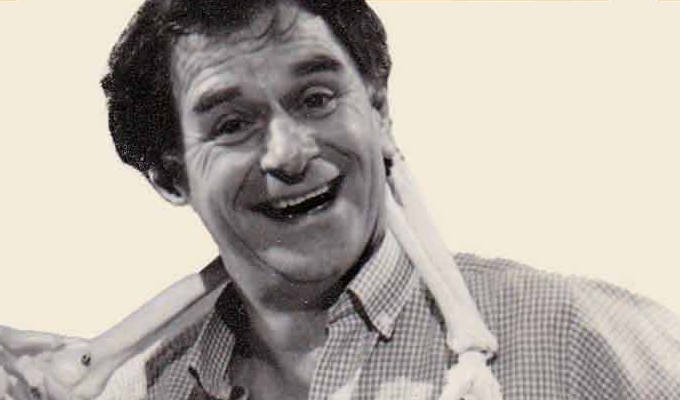
My Previous Life In Comedy by Johnny Ball
First volume of the TV icon's memoirs covers his time as a club comic
Here’s a peculiar bit of showbusiness trivia for you: Who compered the Rolling Stones’ first nationwide UK tour? The answer – as you’ll have guessed from the book under review – is Johnny Ball.
And how was the last person the great vaudevillian Bud Flanagan performed a double act with on TV before he died? You guessed it…
For the avuncular figure who got a generation interested in maths and science through shows like Think Of A Number in the 1970s and 1980s was a stand-up comic before finding fame in children’s TV.
That fact might not be widely known, but that’s an omission he’s keen to rectify with My Previous Life In Comedy, the first of a planned two-volume autobiography, which charts his early showbiz career which – like so many contemporaries – had its roots in national service.
But his interest in entertainment was piqued when, aged 14, he went to Butlin’s on holiday and was impressed by the house captain who cracked corny jokes, and vowed he would follow in his footsteps. Not a bad decision, as it happens, given that redcoat was Des O’Connor.
That’s by far the only name dropped in this portrait of the club scene over his 17-year comedy career. He formed a friendship with Goon Harry Secombe, with whom he did forces tours, and worked with everyone from Freddie Starr to the Bee Gees, Jimmy Tarbuck to Chic Murray, with whom he became drinking buddies.
Ball started as a drummer in the holiday camps, and on the Liverpool scene, where he absorbed what the comedians did on stage. One night, Butlin’s found themselves in desperate need of a comic, and Ball found himself thrust on stage to do an act. Not really having one, he ‘borrowed’ one from a comic called Ricky McCabe. So it came as a shock when the real comedian arrived on the second night – one Ricky McCabe – and Ball had to admit what he had done to an increasingly ashen-faced comic, who saw that night’s planned material evaporate before his eyes.
Joke theft was rampant in those days. Ball was also the victim of the same when a compere deliberately nicked his shtick, having thought Ball had elbowed out a mate from a job.
One of his favourite routines involved swapping the word ’heart’ for ‘pump’ in various romantic songs because that’s all the organ essentially is. He found it used on Sunday Night At The London Palladium and it flopped one night in a club – as he later found out Frank Carson had done it the week before. ‘Eventually I knew of six female acts alone who made it part of their act,’ Ball writes. ‘What price originality?’
But we are jumping ahead. Naturally shy, Ball was initially so nervous he had to incorporate a paper bag he breathed into to calm himself into his opening line. But he soon learned to work a room, and established himself on an exciting club circuit of the Swinging Sixties.
He offers a good-natured portrait of that scene, full of details for those interested in that period of show business history. But the occasional glimpse of material hasn’t dated well. One of Ball’s gag went: ‘What’s worse than having a Beatle in your bed? Having a Searcher in your underwear!’ – of which he insists: ‘It was cheeky and fresh and the kids loved it.’
As he becomes more confident, the anecdotes become more triumphalist – and of course, a less interesting because of it, struggles and failures being inherently more interesting than success.
A recurrent theme is that he could have had far more prosperity as a stand-up had it not been for bad agents. He seems to have had a particularity bad run of them – more through incompetence than crookedness, it seems.
But he was never short of work, even if not always what he wanted.‘Anyone could work the good rooms but comic that could be successful in the Social Toilet Clubs as well were highly sought-after,’ he notes. However, he also believes: ‘Being able to conquer the majority of clubs, including the rougher ones, by adapting my performance to local requirements, was to actually hold me back.’
He was always booked for the rowdy rooms, but found it harder to get into the prestigious ones – and into people’s living rooms. He was dismissed by the BBC as being too ‘blue’ after a scout saw him at a gig where quelling a drunken mob became the priority over delivering crafted gags.
However, the broadcaster did eventually come calling – albeit via the unlikely route of children’s TV – when he was recruited as part of the Play School team. Initially unconvinced by this change of direction, he soon embraced it – and TV became his main focus when he became thoroughly disillusioned with the club circuit and the way those supposed to be helping him treated him.
While Ball is saving most of this for the second volume of his memoirs, there are a few interesting vignettes here. Such as the fact he once wrote a sitcom about dock workers – only to find that not only had one already been created for On The Buses star Reg Varney, but the unions had said that if they ever tried to air such a show, they would shut down every port in the UK.
• My Previous Life In Comedy by Johnny Ball, is published by The Book Guild, is available from Amazon priced £10.99 in paperback and £5.99 on Kindle – or from uk.bookshop.org, below, which supports independent bookstores.
Published: 2 Apr 2025








